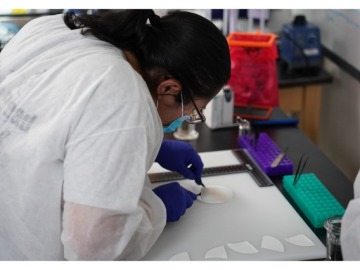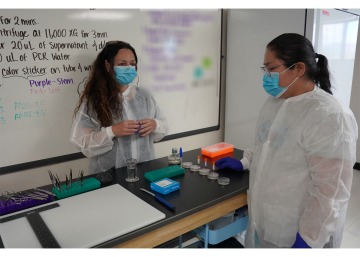Congratulaiton Jessica Begay!
Jessica was awarded the Agnese Nelms Haury Program in Environment and Social Justice “Native Pathways” scholarship to support her research and academic pursuits in the 2024 academic year. The Haury Native Pathways Initiative supports recruiting faculty, researchers, students, and staff whose teaching, scholarship, or outreach centers on matters relevant to Native American and Indigenous resilience. Jessica, who is Diné, is pursuing a Master of Science degree in Biology at Diné College, the nation’s first tribal college. Her research is motivated by the need to understand ongoing impacts of climate change on Indigenous communities and the urgent need for action to mitigate its effects.
Jessica’s proposed research aims to build upon work she conducted as an undergraduate at Dine’ College in the lab of Dr. Demetra Skaltsas. Since 2020, Jessica has participated with the USDA-NIFA “Bridge to STEAM” (B2S) program, a partnership between University of Arizona and Dine’ College to prepare STEAM (A is for agriculture) students for transfer to four-year baccalaureate programs or into careers in a STEAM field. Dr. Skaltsas is the PI from Dine’ College and acts as a research mentor for the tribal college participants.
Image
During a B2S summer research experience in 2021, funded in part by the Agnese Nelms Haury Award (Diné College BRIDGE to STEAM summer research experience), Jessica began investigating fungal endophytes, microscopic fungi that live asymptomatically in plants.
That study explored the endophytic communities of two sage species, Artemisia tridentata, and Artemisia arbuscula. To further investigate the ecological importance of these sagebrush populations and the effects of changing climatic conditions, Jessica’s Master’s degree thesis aims to compare the fungal endophytic communities of Artemisia species during the summer drought of 2021 and the subsequent summer which followed an unusual winter that caused a threat to these types of sages. To deliver the best results possible, her methods include collecting plant tissues in 2022 that come from the same Artemisia individuals as in 2021 and comparing the endophytic communities using traditional cultural and modern molecular barcoding techniques using the Illumina sequencing platform. Jessica said of her research, “As endophytic fungal research has many applications, the possibilities of how this research can positively impact my Nation and people are endless.”
Image
Studying endophytic fungi in the Skaltsas lab has immersed Jessica in current issues surrounding ecology, environmental microbiology, and the impact of climate change on Native lands and Native people. Through her work, she also gained experience in microbiological and molecular skills such as fungal isolation, DNA extraction, DNA amplification, and bioinformatics. “Jessica earned my lab's lead research assistant position by taking the initiative and prioritizing and completing tasks,” said Dr. Skaltsas. “As the lead, she managed several research projects and trained new student interns.”



